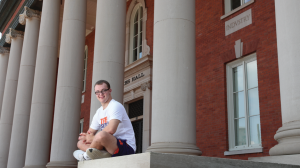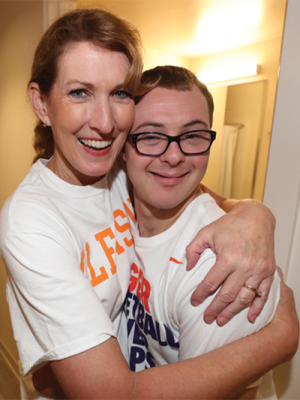Coming Into His Own
“When he began seventh grade, I realized postsecondary education options existed for students with intellectual disabilities,” says the South Carolina resident. “So, we made academic adjustments to his individualized education program. We took charge of his education because a cookie-cutter approach wouldn’t give him the option of going to college.”
To reach this goal, she enlisted the help of Frankie’s doctor, Priya Kishnani, MD, chief of the Division of Medical Genetics in Duke’s pediatrics department. Kishnani also leads Duke’s Comprehensive Down Syndrome Program at Lenox Baker Hospital, a multidisciplinary clinic that offers patient care and resources to approximately 1,500 children and young adults with Down syndrome and their families. The program coordinates with a patient’s primary physician.
With Kishnani’s help, Debbie and her husband created a plan that culminated in Frankie, now 21 and a college sophomore, being accepted into the Clemson Life Program. This Clemson University initiative gives individuals with intellectual disabilities the opportunity to experience college and earn a postsecondary education certificate.
“I think everything we discussed with Dr. Kishnani had an impact on getting Frankie prepared for an opportunity to be accepted into Clemson Life,” Debbie says. “She was the Down syndrome expert who could tell me I was on the right path. She made suggestions, and she knew where I was as a parent and what stage Frankie was at every milestone.”
Not Missing a Thing
However, before Frankie enrolled at Clemson, he had medical, social, and educational needs to address. Living in Mt. Pleasant, close to the Medical University of South Carolina (MUSC), he had an excellent pediatrician, Debbie says. But, she knew only someone with Down syndrome expertise could help her son avoid health pitfalls.
Consequently, when she learned of the Down Syndrome Program, she made an appointment for then-six-year-old Frankie.
“I wanted to ensure I didn’t miss a thing in Frankie’s health care,” she says. “His pediatrician is terrific, but I felt I needed another layer. I didn’t want to make a mistake.”
After the first appointment at Duke, she knew she’d made the right decision. Kishnani was not only interested in Frankie’s health but also in his social development and the educational resources available to him. It was total, well-rounded health care, Debbie says, and she’s returned annually ever since.
Meeting Frankie's Needs
Kishnani says she knew immediately Frankie’s family was dedicated to being active partners in maximizing his health and his abilities, setting him on the path for success.
The program’s intent, Kishnani says, is digging deeper, going beyond what general pediatricians’ offices can provide someone with Down syndrome.
“We monitored Frankie’s ancillary care issues that could be overlooked even though most doctors are fabulous,” she says. “We examined every aspect of Frankie’s care plan to ensure there was nothing needing medical attention that would hinder his progress.”
Frankie doesn’t have many of the physical conditions present in most individuals with Down syndrome, but he received treatment at Duke to improve his overall well-being, Kishnani says. For example, because his family values athletic activity, a clinic-associated orthopaedist fitted Frankie with orthotics to support his ankles and improve his gait and balance for sports. Today, he swims, plays basketball and golf, and lifts weights.
Additionally, a speech therapist created a protocol to augment Frankie’s enunciation and communication abilities, and he was treated for sleep apnea to reduce his pulmonary hypertension risk. MUSC doctors, in consultation with Kishnani, also put tubes in his ears to prevent recurrent ear infections and augment his hearing. Recently, he underwent eye surgery to correct a weak muscle and sharpen his vision.
What the Program Provides
But, the program offers more than coordinated multidisciplinary care for patients, Kishnani says. It addresses the whole family’s emotional and educational needs.
A parents’ advocate discusses a family’s experiences and offers guidance on navigating medical and social situations, and a designated self-advocate is also available to provide insight about opportunities in the community for individuals with Down syndrome. Additionally, a social worker collaborates with the families’ school systems to design educational plans to best meet patients’ needs.
“The social worker gets families plugged into the system correctly and gets them the right services,” Kishnani says. “Whether it’s behavioral services, family counseling, or getting a child established with extra school resources, the social worker’s impact is phenomenal.”
The program also offers a clinic coordinator, genetic counseling support, physical and speech therapy, developmental pediatrics, and several subspecialty referrals, including ophthalmology; audiology; ear, nose, and throat; endocrinology; and cardiology.
And, with financial support from Anna’s Angels, an organization funding Down syndrome research efforts, the program is investigating best practices for treating conditions common in this patient group, including celiac disease, thyroid dysfunction, and iron-deficiency anemia, as well as Down syndrome disintegrative disorder, a condition that impedes an individual’s communication abilities. The organization has provided seed money to advance research dedicated to developing new ways to enhance cognition and adaptive behavior in this patient group.
Enjoying College Life
Today, Frankie lives on campus with two other Clemson Life students and another student who works as an independent living assistant. He attends classes daily—his favorite is budgeting—and manages the apartment with his roommates.
Through Clemson Life, he’s learning to live independently.
“I love hanging out with my friends. I love watching TV, and I like getting to class on time,” Frankie says. “The BGR burger place downtown is my favorite place to hang out, and I love to go to the basketball games.”
Frankie is also on a first-name basis with Clemson’s head football coach “Dabo” Swinney, and they talk about game plans.
Most importantly, though, thanks to his medical care and his family’s health focus, Frankie is physically fit. Individuals with Down syndrome struggle with low muscle tone, but Frankie, 5’6” and 150 pounds, exercises with a personal trainer. In fact, he’s learning to become a trainer himself and helps his younger brother work out.
Debbie credits Duke and Kishnani with giving Frankie many of the resources he needed to succeed.
“Kishnani looks at the whole picture,” she says. “The program isn’t a stiff, corporate setting. It’s very nurturing. The doctors offer tips and help you.”
Kishnani says she’s extremely proud of Frankie. He’s an example of what many individuals with Down syndrome can accomplish with the right care and guidance.
“Frankie is an amazing young man. I’ve seen his perseverance and his family’s commitment, and I believe we, at the clinic, have been part of that story,” she says. “Frankie is an advocate for individuals with Down syndrome. He cheers people on. He’s inspirational and is a contributing member of society who brings a lot to the table. It has been our team’s privilege to be a part of Frankie’s care team and watch him come into his own.”
At a Glance
- Frankie Antonelli, a young man with Down syndrome, has overcome many challenges to become a college student.
- When Frankie was in seventh grade, his mother, Debbie, enlisted the help of Priya Kishnani, MD, at Duke's Comprehensive Down Syndrome Program.
- Thanks in part to the program's help, Frankie is now a sophomore in the Clemson Life Program at Clemson University, where he is making strides toward living a fulfilling, independent life.
Photographs by Kent Smith
November 16, 2018
"[Frankie] cheers people on. He's inspirational and is a contributing member of society who brings a lot to the table."
Priya Kishnani, MD - Duke's Comprehensive Down Syndrome Program




